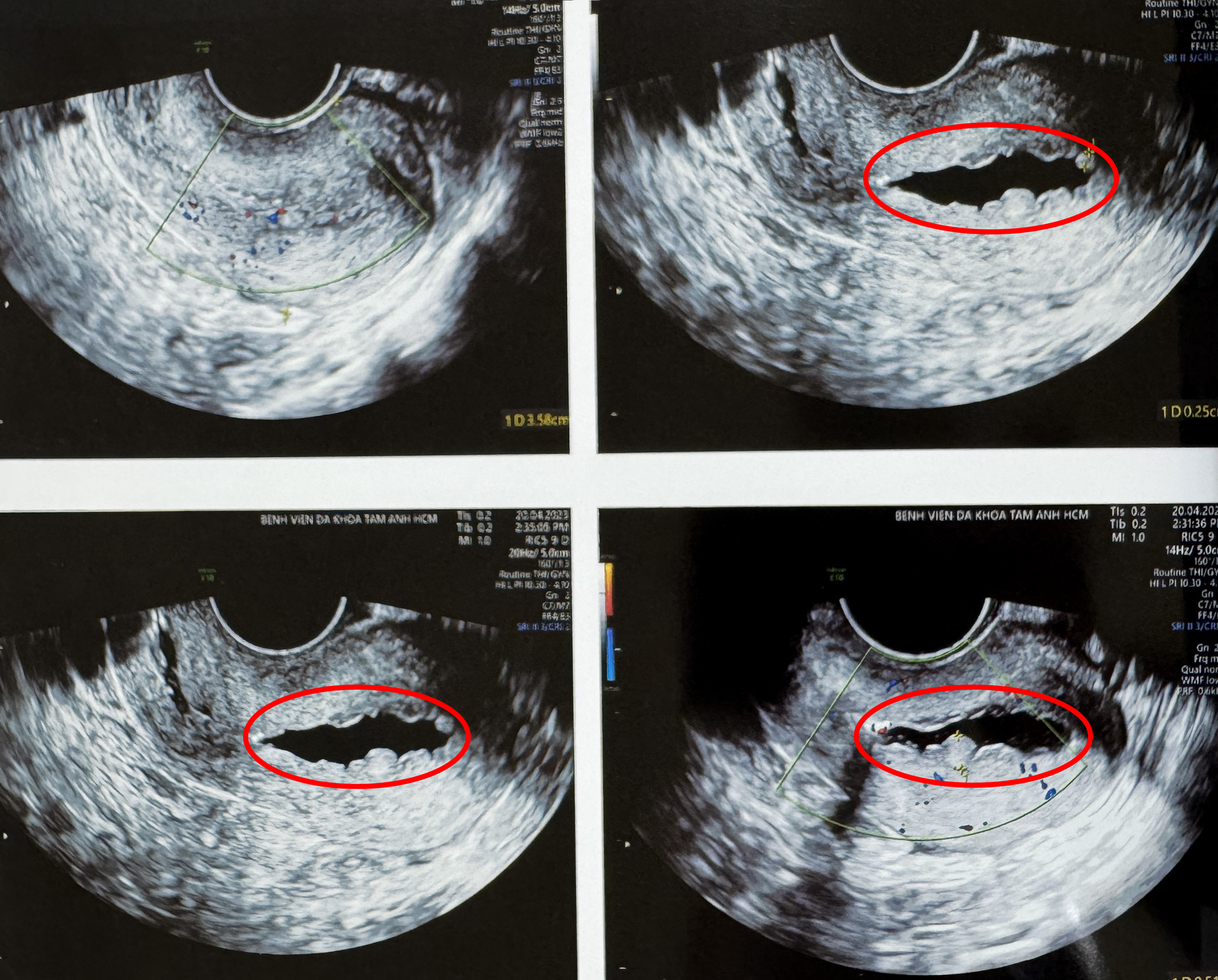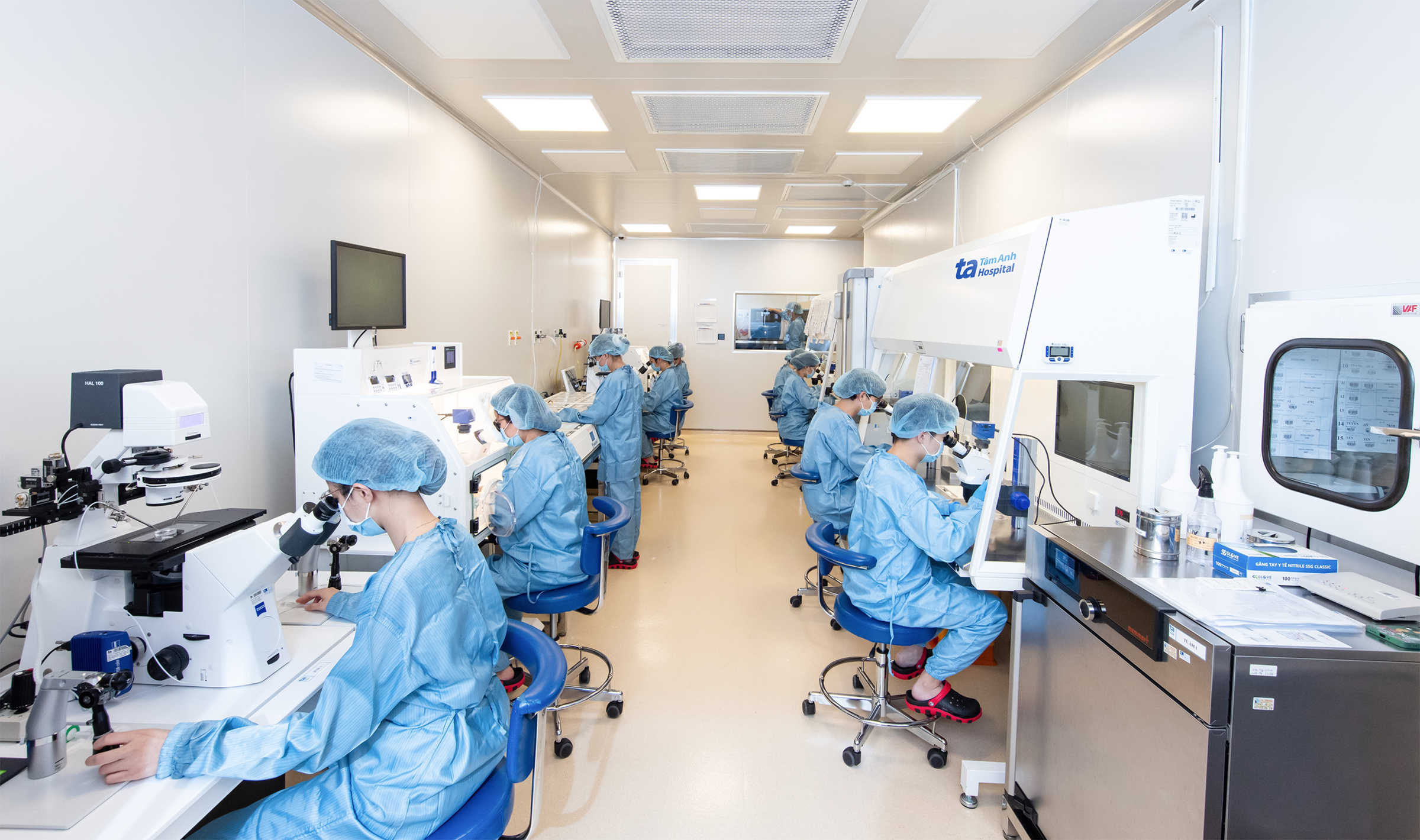"This is the first case of tuberculosis in the uterine lining causing infertility that we have treated," said Doctor Ngo Dinh Trieu Vy from the Center for Reproductive Assistance at Tam Anh General Hospital in Ho Chi Minh City (IVF Tam Anh TP HCM). According to medical literature, uterine tuberculosis is rare and usually a complication of pulmonary tuberculosis. Kieu, 33, had this condition but showed no signs of tuberculosis in her lungs.
Kieu and her husband came to IVF Tam Anh TP HCM after two years of marriage without conceiving. Her husband's reproductive health was normal, but Kieu's fallopian tubes were completely blocked, with multiple lumps and thick endometrial polyps in her uterus. Doctor Vy took a biopsy and confirmed that Kieu had endometrial tuberculosis, also known as genital tuberculosis, caused by the Mycobacterium tuberculosis bacteria.
 |
Kieu's ultrasound results show an irregular serrated uterus due to the tuberculosis bacteria. Photo: Tam Anh General Hospital |
Kieu's ultrasound results show an irregular serrated uterus due to the tuberculosis bacteria. Photo: Tam Anh General Hospital
Tuberculosis bacteria mainly spread from the primary site of infection, the lungs, and then invade other organs through the bloodstream. In some cases, the bacteria directly attack other organs, such as in cases of tuberculous meningitis or genital tuberculosis. According to Doctor Vy, most cases of genital tuberculosis affect the fallopian tubes and invade the uterine lining. They destroy the basal layer, impairing the endometrium's ability to regenerate, and causing fibrous adhesions that connect the two walls of the uterus.
If detected and treated late, the uterine lining can be completely destroyed and unable to recover, potentially leading to infertility. Even after treatment eliminates the pathogen, assisted reproduction can still be difficult due to permanent scarring in the uterus.
After 6 months of anti-tuberculosis medication to completely eradicate the bacteria, Kieu returned to IVF Tam Anh for in vitro fertilization. Doctors stimulated her ovaries with an appropriate dose of medication, retrieving 24 mature eggs. Embryologists selected healthy sperm from her husband and injected them into the egg cytoplasm, culturing the embryos in a dynamic incubator system, resulting in 7 good quality day-5 embryos.
 |
Embryo culture room system at IVF Tam Anh. Photo: Nguyen Thang |
Embryo culture room system at IVF Tam Anh. Photo: Nguyen Thang
A hysteroscopy showed improvement in Kieu's uterine lining. She underwent endometrial preparation for embryo transfer and conceived on the second attempt. In early August, she gave birth to a healthy baby girl weighing almost 3 kg. The remaining embryos were frozen for the couple to have more children in the future.
According to Doctor Giang Huynh Nhu, Director of IVF Tam Anh, 60% of patients there are difficult cases, such as older couples, those with long-term infertility, multiple failed embryo transfers, rare diseases, or multiple comorbidities. Medical literature records few successful cases of treating infertility caused by endometrial tuberculosis. Patients only have a chance of conceiving if the disease is detected and treated early, before the glandular tissue and basal layer of the endometrium are completely destroyed.
Endometrial tuberculosis may have no specific symptoms and can progress silently. In advanced stages, the symptoms are similar to other gynecological conditions, leading to complacency and misdiagnosis. Therefore, women should seek medical attention if they experience any unusual signs in their reproductive system, such as pain or irregular menstrual cycles. Couples who haven't conceived after a year of marriage should undergo examinations, including a hysteroscopy, to accurately diagnose any underlying conditions early and increase the chances of successful treatment.
Tuberculosis bacteria are most contagious in people with pulmonary tuberculosis if left untreated. Patients should adhere to the prescribed anti-tuberculosis medication regimen to eliminate the bacteria, prevent drug resistance, and avoid recurrence. Family members should prioritize hygiene, avoid sharing personal items, and refrain from contact with the patient's secretions to prevent the risk of infection.
Hoai Thuong
*The patient's name has been changed.












